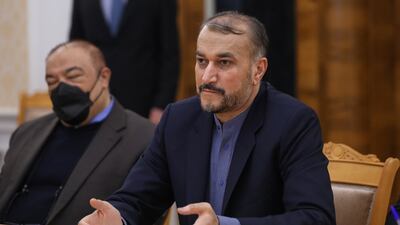US steps on lifting sanctions are "good but not enough", Iran said Saturday, following Washington's announcement it was waiving sanctions on Iran's civil nuclear programme.
The US action came as talks to restore a 2015 deal between Tehran and world powers over its nuclear programme reached an advanced stage, with the issue of sanctions relief a major issue.
"The lifting of some sanctions can, in the true sense of the word, translate into their good will. Americans talk about it, but it should be known that what happens on paper is good but not enough," Iranian Foreign Minister Hossein Amir-Abdollahian said, quoted by ISNA news agency.
The secretary of Iran's Supreme National Security Council also reflected Tehran's view that the US move falls short.
"Real, effective and verifiable economic benefit for Iran is a necessary condition for the formation of an agreement," Ali Shamkhani said in a tweet.
"The show of lifting sanctions is not considered a constructive effort."
The US State Department said Friday it was waiving sanctions on Iran's civil nuclear programme in a technical step necessary to return to the 2015 Joint Comprehensive Plan of Action, or JCPOA.
Former president Donald Trump withdrew from the pact in 2018 and reimposed crippling sanctions on Iran, prompting the Islamic republic to begin pulling back from its commitments under the deal.
The waiver allows other countries and companies to participate in Iran's civil nuclear programme without triggering US sanctions on them, in the name of promoting safety and non-proliferation.
Iran's civil programme includes growing stockpiles of enriched uranium.
Amir-Abdollahian reiterated that one of the "main issues" in the JCPOA talks is obtaining guarantees that the US will not withdraw from the 2015 deal again.
"We seek and demand guarantees in the political, legal and economic sectors," he said, adding that "agreements have been reached in some areas".
Iran is negotiating with Britain, China, France, Germany and Russia directly and with the US indirectly in the Vienna talks, which different parties say have reached a stage where the sides have to make important "political decisions".
"Our negotiating team in the Vienna talks is seriously pursuing obtaining tangible guarantees from the West to fulfil their commitments," Amir-Abdollahian said.
Foreign ministry spokesman Saeed Khatibzadeh said Iran is "carefully considering any action that is in the right direction of fulfilling the obligations of the JCPOA", Iranian media reported.
The European parties to the talks urged Iran to seize the "opportunity" of the US waivers.
"This should facilitate technical discussions necessary to support talks on JCPOA return in Vienna," negotiators of Britain, France and Germany said in a joint statement Saturday.
"We urge Iran to take quick advantage of this opportunity, because the timing of the waiver underscores the view we share with the US: we have very little time left to bring JCPOA talks to a successful conclusion."
Moscow's ambassador to the UN in Vienna, Mikhail Ulyanov, welcomed the US waiver decision as "a move in the right direction".
"It will help expedite restoration of #JCPOA and mutual return of #US and #Iran to compliance with 2015 deal. It also can be seen as an indication that the #ViennaTalks have entered the final stage," he wrote on Twitter.
Talks on reviving the nuclear deal were halted last week and the negotiators returned to their capitals for consultations.
Experts say the talks could resume next week.
US President Joe Biden moved quickly to seek a return to the agreement after he succeeded Trump a year ago, but Western parties say Iran in the meantime has moved closer to producing enough fissile material for a nuclear weapon - which the JCPOA aimed to avoid.
Iran has always denied seeking an atomic bomb.
"The technical discussions facilitated by the waiver are necessary in the final weeks of JCPOA talks," a State Department official said Friday.
The US official insisted that the move was not "part of a quid pro quo", as the partners in the JCPOA talks await Iran's response on key issues.
State Department spokesman Ned Price insisted this US step is a sanctions waiver for the civil nuclear program and not broader sanctions relief.
Barbara Slavin, an Iran expert at the Atlantic Council, said the resumption of the waiver was a positive step.
"It's a necessary prerequisite to restoring the JCPOA and thus a good sign that this can be accomplished," she told AFP.
"These sanctions were among the dumbest and most counterproductive imposed by the former administration," she added.









